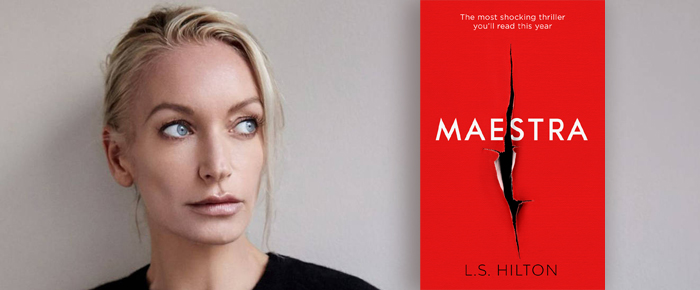
By Heidi Simmons
—–
“Maestra”
by L. S. Hilton
Fiction
—–
I think it’s fair to say that women must work twice as hard as men to achieve equal wealth and power. I’m not sure women can ever truly have the power men possess. But some women try and they’ll do whatever they can to get it. In L. S. Hilton’s Maestra (Penguin Random House, 320 pages) an ambitious and class conscious woman finds that her climb to the top is deadly.
The story is about Judith Rashleigh, who, born on the wrong side of the tracks, wants to make something more of herself. From a broken home and raised by a drunken mother, her shame and humiliation runs deep.
Wanting to change her circumstances, Judith goes to graduate school and studies art history. She modifies her accent and tries to look the part of a posh, educated, well-bred young woman.
When she gets a job at a London art house, Judith can’t seem to make a mark until she discovers that a painting up for auction is a fraud. But, instead of recognition for her efforts, she’s fired. She quickly realizes the art house is part of the deception.
Upset and short of cash, she takes a job working at a high-end champagne bar where rich men buy expensive drinks so they can talk and spend time with pretty women. Judith uses her middle name, Lauren, as an alias.
Lauren finds the commission-only job tawdry, but lucrative. She can now afford to buy designer clothes, pay her rent and still have money left over to go out and party. Judith is a swinger and enjoys sex with multiple partners. In fact, sex is her drug of choice.
After one of her “champagne” clients takes her and a female friend to the South of France, Judith realizes life is not fair no matter how hard you work. When her host dies, she becomes a predator.
Using the power of seduction and sex, Lauren manipulates her way up the social ladder. She gets what she wants but there is always a price – she becomes a killer and discovers she likes it.
Maestra gives the reader a new and complicated femme fatale. Judith/Lauren travels to exotic locations and spends time with beautiful people and ugly billionaires. She is young, smart and decidedly deadly.
Much of what happens to Judith is not always her fault. In some cases she is a victim. But she resents being used and abused so she turns the tables. Judith struggles to be a person that she herself admires. And as things get more complicated, Judith starts to accept the woman she is becoming. She finds her power and likes it.
Author L.S. Hilton takes the reader into the art world of great painters and fraud. She introduces a connection between Judith and the 18th century Italian woman painter Artemisa Gentileschi whose work inspires and drives Judith. As an artist, Gentileschi would not be ignored and eventually she was recognized by the male painters of her time. Gentileschi’s paintings become Judith’s road map.
The title is intriguing. “Maestra” is not a real word, but Hilton uses it as the feminine version of maestro to make an important point. Like a conductor of an orchestra, controlling and directing multiple elements to bring about a masterpiece, Judith is in charge. Not a male figure. But what Judith does not realize is that she is not actually in control.
Although I could keep count of those who Judith killed, I couldn’t keep up with her sex partners. There is detailed erotic and often sleazy sex throughout Maestra. It’s raw, angry and self-destructive.
I didn’t hate Judith. She’s young, confused and lonely. But she is a killer and I was shocked and surprised by her viciousness — all the while wearing designer clothes and accessories.
Maetsra is the first installment of a three-part series. This is not a Shades of Grey hardcore reboot. Judith is a troubled soul and her narrative is far from innocent. But unlike “Shades,” I look forward to reading what happens next and how her life turns out.












































